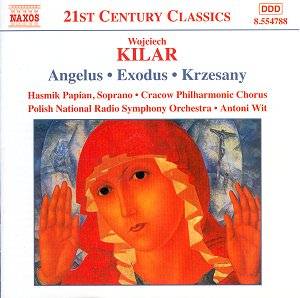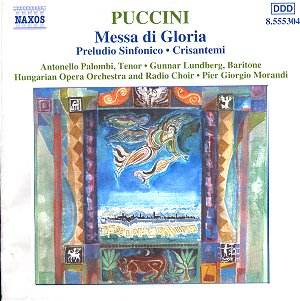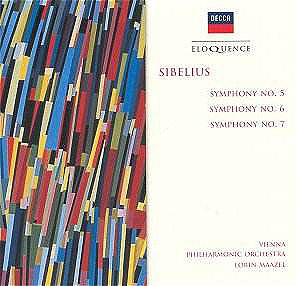 Composer: Wojciech Kilar
Composer: Wojciech Kilar
Works: Krzesany (1974), Angelus (1984), Exodus (1981), Victoria (1983)
Performers: Hasmik Papian (soprano), Cracow Philharmonic Chorus, Jaček Mentel (Chorus Master), Polish National Radio Symphony Orchestra (Katowice), Antoni Wit
Recording: Grzegorz Fitelberg Concert Hall, Katowice, January 1994
Label: Naxos 8.554788
Wojciech Kilar, born in 1932, occupies a unique position within the landscape of contemporary classical music, notable for his evolution from the Polish avant-garde to more accessible, folk-infused compositions. This recording presents a compelling selection of his works from the 1970s and 1980s, showcasing the breadth of his musical language. Kilar’s early engagement with avant-garde techniques, often aligned with figures such as Penderecki and Górecki, gradually gave way to a style that embraces melodic clarity and rhythmic vitality, reflecting a deep-rooted connection to Polish cultural heritage.
The opening work, Krzesany, is a vibrant exploration of Polish folk themes, invoking the spirit of the Tatra Mountains. The dense, resonant string chords that introduce the piece immediately resonate with the listener, echoing the emotional depth typical of Górecki’s work. However, Kilar diverges with his unique voice, weaving through contrasting sections that oscillate between introspective contemplation and exuberant folk dances. The standout moment occurs around 6:43, where a peasant-like dance emerges, reminiscent of Bartók, embodying a visceral, earthy quality before devolving into a frenzied climax. This oscillation between folk elements and avant-garde dissonance effectively illustrates Kilar’s ability to fuse traditional and modern idioms, culminating in a riotous conclusion that is both exhilarating and chaotic.
Angelus reveals a different facet of Kilar’s artistry, presenting a grand setting of the Ave Maria text that balances solemnity with profound beauty. The work opens with a haunting exchange between male and female voices, gradually building tension before the orchestra joins in a climactic swell. Kilar’s orchestration here is particularly noteworthy; the lush strings and ethereal soprano lines create a transcendental atmosphere, drawing echoes of Górecki’s minimalist approach while maintaining Kilar’s distinct voice. The culmination of the work, where the choir exalts the name of Jesus, is a moment of both power and serenity, showcasing Kilar’s skill in crafting deeply emotive choral textures.
Exodus is perhaps Kilar’s most ambitious work on this recording, likened to Ravel’s Boléro for its gradual crescendo and thematic development. The clarinet’s haunting melody, introduced at the outset, serves as the thematic anchor, undergoing a series of intricate transformations throughout the piece. This work exemplifies Kilar’s mastery of orchestral color, with each instrumental layer adding depth and complexity to the original theme. The transition to the choir’s rapid biblical exclamations introduces an exhilarating shift in momentum, heightening the dramatic tension before driving towards a triumphant resolution. The disciplined execution by the Polish National Radio Symphony Orchestra under Antoni Wit captures both the vigor and the delicate nuances of Kilar’s orchestration.
Victoria, the final work, is notably brief yet encapsulates the essence of Kilar’s compositional style. Its martial precision and celebratory tone evoke comparisons to Orff, while also exhibiting unmistakable traits of film score composition reminiscent of Jerry Goldsmith. This compact piece effectively distills the composer’s techniques into an accessible format, concluding the program with an emphatic, spirited resolution.
The recording quality is commendable, with vivid sound engineering that allows each instrument and voice to shine distinctly within the ensemble. The performances are imbued with a palpable energy, particularly the contributions from the Cracow Philharmonic Chorus, whose clarity and precision bring Kilar’s choral writing to life. The engineering captures the lush textures and dynamic range of the orchestra, ensuring that the subtleties of Kilar’s orchestration are fully realized.
Wojciech Kilar’s music, while perhaps not groundbreaking in its originality, is undeniably engaging and rich in color. The combination of folkloric elements with accessible harmonic language offers a refreshing perspective within the contemporary canon. This recording serves as an excellent introduction to Kilar’s oeuvre, appealing to those who appreciate the later works of Górecki, Kancheli, or even Arvo Pärt. With its superlative performances and well-executed sound engineering, this collection stands as a testament to Kilar’s enduring legacy and the vitality of his musical voice.



